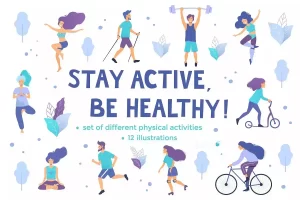How can overweight and obesity be reduced?

- Limit energy intake from total fats and sugars
- Increase consumption of fruit and vegetables, as well as legumes, whole grains and nuts
- Engage in regular physical activity (60 minutes a day for children and 150 minutes spread through the week for adults)
- Individual responsibility can only have its full effect where people have access to a healthy lifestyle. Therefore, at the societal level it is important to support individuals in following the recommendations above, through sustained implementation of evidence based and population based policies that make regular physical activity and healthier dietary choices available, affordable and easily accessible to everyone, particularly to the poorest individuals. An example of such a policy is a tax on sugar sweetened beverages.
The food industry can play a significant role in promoting healthy diets by
Reducing the fat, sugar and salt content of processed foods
Ensuring that healthy and nutritious choices are available and affordable to all consumers
Restricting marketing of foods high in sugars, salt and fats, especially those foods aimed at children and teenagers
Ensuring the availability of healthy food choices and supporting regular physical activity practice
Eat Well
Calories matter for weight-and some foods make it easier for us to keep our calories in check. Healthy eating is a key to good health as well as maintaining a healthy weight. It’s not only what and how much we eat but also, it seems, how we eat that’s important.
What to Eat
Choose minimally processed, whole foods:
- Whole grains (whole wheat, steel cut oats, brown rice, quinoa)
- Vegetables (a colorful variety-not potatoes)
- Whole fruits (not fruit juices)
- Nuts, seeds, beans, and other healthful sources of protein (fish and poultry)
- Plant oils (olive and other vegetable oils)
Drink water or other beverages that are naturally calorie-free.
Limit these foods and drinks:

- Sugar-sweetened beverages (soda, fruit drinks, sports drinks)
- Fruit juice (no more than a small amount per day)
- Refined grains (white bread, white rice, white pasta) and sweets
- Potatoes (baked or fried)
- Red meat (beef, pork, lamb) and processed meats (salami, ham, bacon, sausage)
- Other highly processed foods, such as fast food
- A good example of an overall healthy diet is the Harvard School of Public Health’s Healthy Eating Pyramid and Healthy Eating Plate. The Nutrition Source, a companion website to The Obesity Prevention Source, also offers a quick guide to choosing healthy drinks, as well as recipes and quick tips for eating right.
How Much to Eat
Age, gender, body size, and level of physical activity dictate how many calories you need each day to lose weight or to stay at a healthy weight. With two out of three adults overweight or obese, it’s clear that many of us need to eat fewer calories.
Online calorie-needs calculators are a bit over-generous with their recommendations. And, in practice, it’s hard for people to track the amount of calories they take in each day.
A better approach: Adopt habits that will help you avoid overeating (see below)-and skip some of the high-calorie, low-nutrient foods that are most strongly linked to weight gain, such as sugar-sweetened beverages, refined grains, and potatoes.
How to Avoid Overeating

- Eat breakfast. While it seems like skipping a meal is an easy way to cut calories, skipping breakfast usually backfires when hunger comes raging back mid-day, often leading to overeating.
- Choose small portions and eat slowly. Slowing down at meals and choosing smaller portions can help avoid overeating by giving the brain time to tell the stomach when it’s had enough food. Limiting distractions-turning off the television, computer, or smartphone-can also help us focus on the food.
- Eat at home. Fast food, restaurant meals, and other foods prepared away from home tend to have larger portions and be less nutritious than the foods we cook for ourselves.
- Eat mindfully. Taking time to think about why you’re actually eating is an easy way to avoid needless calories. Hungry? Make the healthiest food and drink choices possible. Not really hungry? Choose something else to do or have a piece of fruit instead of a full meal.
Stay Active

- Besides eating a healthy diet, nothing is more important to keeping weight in check and staying healthy than regular activity. If there ever were a magic bullet for good health, physical activity would be it.
- How much activity is recommended depends on whether you’re a child or an adult and what your goals are: good health or weight control. There are a lot of ways to get moving. Choose activities you enjoy.
- In addition to staying active, it’s important for all age groups to minimize “sit time” (sedentary time), especially time spent watching television.
- Physical Activity Recommendations for Adults:
For good health: 2.5 hours a week of moderate activity (brisk walking, slow bike riding) or 1.25 hours a week of vigorous activity (running, fast bike riding).
For weight control: 1 hour a day of moderate to vigorous activity. This activity can be pieced together from short bursts of 10 minutes or more.
Physical Activity Recommendations for Children:
At least 1 hour a day of moderate to vigorous physical activity each day, which can be pieced together from short bursts of 10 minutes or more.
Muscle-strengthening and bone-strengthening activities at least three days a week.
Key to these recommendations is that all activities should be age appropriate and fun, and keep kids moving and breathing at an increased rate.
Get Enough Sleep

There is more and more evidence that a good night’s sleep is important to good health-and may also help keep weight in check. How much a person needs can vary a great deal, but there is good evidence that a lot of children and adults don’t get enough. Here are some general recommendations for sleep duration.
Adults:
7 to 8 hours a night
Children:
1-3 years old: 12 to 14 hours a night
3-5 years old: 11 to 13 hours a night
5-12 years old: 10 to 11 hours a night
Adolescents: 8.5 to 9.25 hours a night
Source: National Sleep Foundation

- Today’s world is full of daily stresses. This is a normal part of life, but when these stresses become too much, they can take a toll on health and contribute to weight gain by leading to unhealthy eating and other unhealthy activities.
- One of the best ways to control stress is also one of the best ways to combat weight gain: regular physical activity. Mind body approaches, such as breathing exercises, can also be beneficial.
